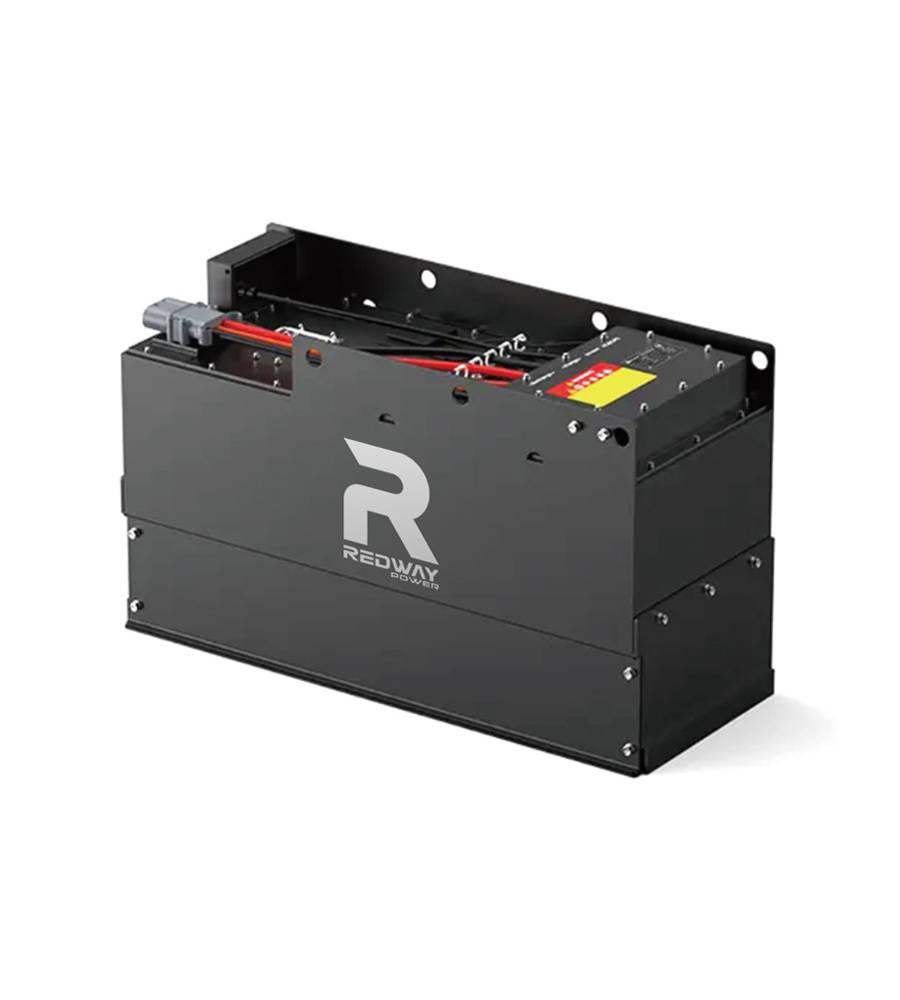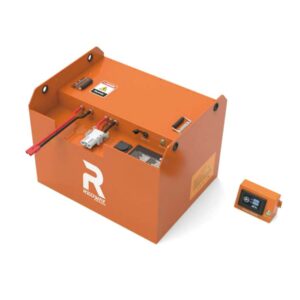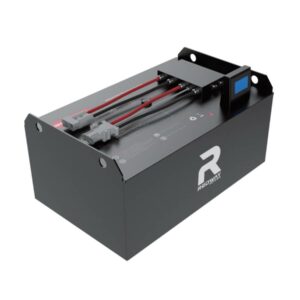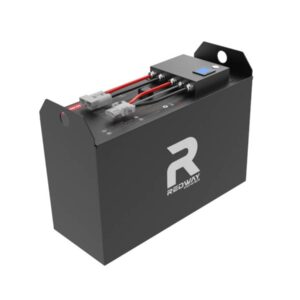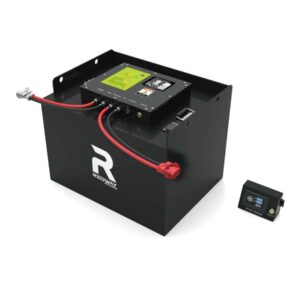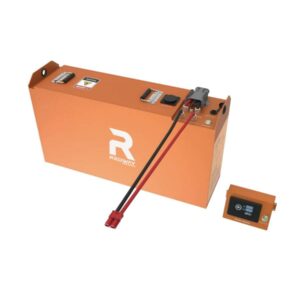Description
Our 51.2V 210Ah LiFePO4 battery delivers 10.75kWh of reliable energy, designed for industrial and commercial applications. As a leading lithium battery manufacturer, we specialize in high-performance OEM solutions, combining advanced BMS technology, rugged metal construction, and a 5-year warranty to ensure durability and safety.
Key Features
High-Capacity LiFePO4 Technology: Built with lithium iron phosphate cells for stability, longevity, and thermal safety.
Industrial-Grade Performance: Supports 210A continuous charge/discharge, ideal for heavy-duty equipment like 48V 460Ah LiFePO4 forklift batteries.
Smart BMS Protection: Monitors SOC, temperature, and voltage while preventing overcurrent, short circuits, and overtemperature risks.
IP65 & Natural Cooling: Dustproof, waterproof, and maintenance-free operation across -20¡æ to 60¡æ environments.
Scalable OEM Solutions: Customizable communication protocols (RS485, CAN-bus, 4G) for seamless integration with energy systems.
Product Description
This lithium battery offers a 51.2V nominal voltage and 210Ah capacity, optimized for demanding applications such as electric forklifts, renewable energy storage, and off-grid power systems. Its compact metal housing (949*374*550 mm) ensures space efficiency, while the >4,000-cycle lifespan at 80% DOD reduces long-term costs.
As a trusted lithium battery manufacturer, we prioritize OEM partnerships, tailoring configurations to meet specific voltage, capacity, or communication needs. The integrated BMS guarantees real-time diagnostics, enhancing safety and operational transparency.
The 48V 200Ah LiFePO4 forklift battery offers high energy capacity, fast charging, and exceptional cycle life, providing reliable and maintenance-free power for industrial forklifts. Its advanced Battery Management System (BMS) enhances safety and longevity, while its lightweight design improves forklift efficiency and reduces operational costs, making it an excellent alternative to traditional lead-acid batteries.
How Does the 48V 200Ah LiFePO4 Forklift Battery Improve Forklift Performance?
This battery delivers consistent voltage and high discharge currents, enabling forklifts to operate efficiently under heavy loads. Its lithium iron phosphate chemistry supports rapid charging and deep discharges without compromising battery health. The reduced weight compared to lead-acid batteries enhances forklift maneuverability and reduces wear on mechanical components, increasing overall productivity.
What Are the Key Technical Specifications of the 48V 200Ah LiFePO4 Forklift Battery?
| Specification | Details |
|---|---|
| Nominal Voltage | 48V (51.2V typical) |
| Capacity | 200Ah |
| Energy | Approx. 10.24 kWh |
| Chemistry | Lithium Iron Phosphate (LiFePO4) |
| Continuous Discharge Current | 100A |
| Peak Discharge Current | 200A (5 seconds) |
| Charge Current | 100A |
| Cycle Life | 3,500–6,000 cycles at 70–80% DoD |
| Operating Temperature Range | -20°C to 60°C |
| Weight | Approx. 60–80 kg |
| Dimensions (L×W×H) | ~650 × 260 × 450 mm |
| Protection Rating | IP54 |
| Communication Protocols | RS485, CAN bus, optional 4G |
| Safety Certifications | UN38.3, MSDS, UL1642, IEC62619 |
Which Forklift Models and Applications Are Best Suited for This Battery?
The 48V 200Ah LiFePO4 battery is compatible with a wide range of electric forklifts, pallet jacks, and material handling equipment. It is ideal for warehouses, manufacturing plants, logistics centers, and outdoor industrial environments requiring reliable, high-performance power with minimal maintenance.
Why Is LiFePO4 Chemistry Preferred Over Lead-Acid Batteries for Forklifts?
LiFePO4 batteries provide superior thermal stability and safety, reducing risks of thermal runaway and acid leaks common in lead-acid batteries. They offer longer cycle life—typically 3 to 6 times that of lead-acid—faster charging, and stable voltage output, improving forklift uptime and lowering total cost of ownership. Additionally, LiFePO4 batteries are maintenance-free and environmentally friendly.
How Does the Battery Management System (BMS) Enhance Safety and Longevity?
The integrated BMS continuously monitors cell voltages, temperature, and current, preventing overcharge, over-discharge, short circuits, and overheating. It balances cells to maximize capacity and lifespan. Advanced BMS features include remote monitoring via RS485, CAN bus, or optional 4G connectivity, enabling real-time diagnostics and predictive maintenance.
When Should Fleet Operators Consider Upgrading to a 48V 200Ah LiFePO4 Battery?
Operators should upgrade when lead-acid batteries show reduced runtime, increased maintenance costs, or when expanding fleet operations. The 48V 200Ah LiFePO4 battery’s long cycle life, fast charging, and smart monitoring provide significant operational and financial benefits.
Where Is the Ideal Environment for Operating and Storing This Forklift Battery?
Optimal performance occurs in environments with ambient temperatures between -20°C and 60°C. The battery’s IP54-rated enclosure protects against dust and moisture, suitable for indoor and semi-outdoor industrial settings. Storage in dry, temperature-controlled areas maximizes lifespan.
Does the Battery Support Fast Charging and High Discharge Rates?
Yes, it supports continuous discharge currents of 100A and peak discharge currents up to 200A for short bursts, meeting forklift power demands. The battery also supports fast charging at 100A, reducing downtime during shift changes.
Has Heated Battery Integrated Advanced Features in This Forklift Battery?
Heated Battery incorporates high-quality LiFePO4 cells with a smart BMS to ensure safety, reliability, and long service life. Optional features include real-time cloud monitoring, 4G connectivity, and customizable communication protocols. Heated Battery’s rigorous quality control and certifications guarantee a durable, high-performance product.
Can This Battery Be Customized for Specific Forklift Requirements?
Yes, Heated Battery offers customization in size, capacity, communication options, and safety features to fit various forklift models and operational demands, ensuring seamless integration and optimal performance.
How Does the Weight of the 48V 200Ah LiFePO4 Battery Compare to Lead-Acid Alternatives?
The LiFePO4 battery weighs approximately 60–80 kg, significantly lighter than equivalent lead-acid batteries that can exceed 150 kg. This weight reduction improves forklift energy efficiency, maneuverability, and reduces wear on components.
What Maintenance Is Required for the 48V 200Ah LiFePO4 Forklift Battery?
Maintenance is minimal. Routine inspections of terminals and connectors are recommended, along with monitoring battery health via the BMS or optional remote systems. Unlike lead-acid batteries, there is no need for electrolyte refilling or equalization charging.

